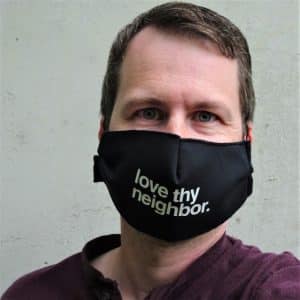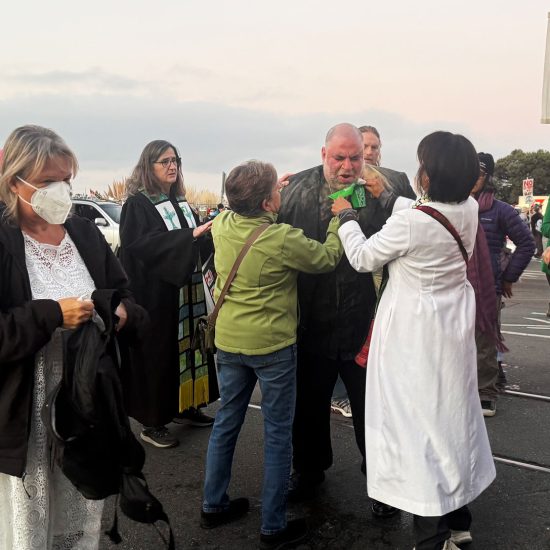
A majority of the justices on the U.S. Supreme Court view religious worship as comparable to getting a manicure or visiting a bike shop. I find the comparisons offensive, and I view the push for a pandemic privilege for religion as dangerous.

Brian Kaylor
While I’ve found it odd to preach in an empty sanctuary to a camera or to lead a Bible study on a computer in my home, sacrificing to keep our communities safe is part of what I read in the Bible about loving our neighbors. So, I don’t appreciate justices claiming to protect our rights by watering down what happens in a worship service to just another commercialistic endeavor in pursuit of the almighty dollar.
On Feb. 5, the justices split on dealing with California’s coronavirus restrictions. A majority ended the ban on indoor gatherings for houses of worship but not for any other gatherings. Although the justices did, for now, uphold the ban on indoor singing, some even wanted to carve out a special exemption just for religious groups even though health officials have warned for months that singing in houses of worship is a recipe for super-spreader COVID-19 events. Then on April 9, a majority of justices ended California’s restrictions on at-home worship but not other such gatherings in private homes.
Justice Kagan correctly noted in a dissenting opinion on Feb. 5 that “making a special exception for worship services” not only risks the health of people during a pandemic but also upsets our healthy church-state balance. She added that since the majority “insists on treating unlike cases, not like ones, equivalently,” the justices run afoul of the “neutrality rule” when it comes to religion. She repeated this warning on April 9, criticizing the majority for trying to “equally treat apples and watermelons.”
Her point about treating religious gatherings like other mass gatherings remains the key to the conflict on the Court. Several justices insist that officials should instead treat a religious mass gathering like a grocery run.
Justice Gorsuch, who wanted to also overturn — just for religious groups — the ban on indoor singing, insisted in a concurring opinion on Feb. 5 to comparing church services to moments quite unlike a religious gathering: “movie studios, malls, and manicurists.” Although scoring points for alliteration, his comparison does not work. Such rhetoric does not honor religious worship but profanes it.
And in a November concurring opinion about restrictions in New York, Gorsuch compared churches to hardware stores, bike shops, and liquor stores. He criticized New York’s governor, writing, “In his judgment laundry and liquor, travel and tools, are all ‘essential’ while traditional religious exercises are not. That is exactly the kind of discrimination the First Amendment forbids.”
 But Gorsuch’s argument shows little understanding of what a church gathering is actually like. When I head to the mall or the bike shop, I don’t greet and hug people, I don’t sit around with a large group for an hour or more, and I don’t sing while in close proximity to those people. If I did act like that at a mall or bike shop, I’m pretty sure a security guard would show me the door! I assume the same behavioral expectations exist when visiting the wine shop, but I can’t say for sure (I’m a Baptist, after all).
But Gorsuch’s argument shows little understanding of what a church gathering is actually like. When I head to the mall or the bike shop, I don’t greet and hug people, I don’t sit around with a large group for an hour or more, and I don’t sing while in close proximity to those people. If I did act like that at a mall or bike shop, I’m pretty sure a security guard would show me the door! I assume the same behavioral expectations exist when visiting the wine shop, but I can’t say for sure (I’m a Baptist, after all).
By treating religious gatherings not like a gathering but like a visit to a store, Gorsuch and his fellow justices discriminate against secular mass gatherings that are still governed by the restrictions the justices removed from houses of worship in places like California. That, to quote Gorsuch, is exactly the kind of discrimination the First Amendment forbids.
While Gorsuch cites the Free Exercise Clause of the First Amendment in both of his opinions, he ignores the Establishment Clause that sits next to it. But we must respect them both. Together, they demand balance — something the Court’s majority forgets. To create a pandemic privilege for religion does not respect religious liberty but violates it by letting the government pick and choose winners based on religious status.
Unlike Gorsuch, a virus like COVID-19 does not care if a mass gathering is religious or not. It does not stop at the door of a church or run away if the words of a song speak of God. While religious gatherings should not be treated with harsher restrictions than other mass gatherings, they also should not be exempt from the same life-saving health rules to which similar events are subjected.
To do otherwise is to dishonor science, the Constitution, and religious worship. So, I pray Gorsuch will start keeping his hands — manicured or not — off our healthy church-state balance.
Brian Kaylor is president & editor-in-chief of Word&Way. Follow him on Twitter: @BrianKaylor.






